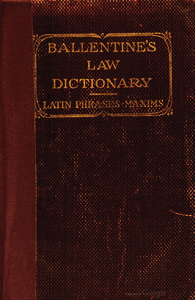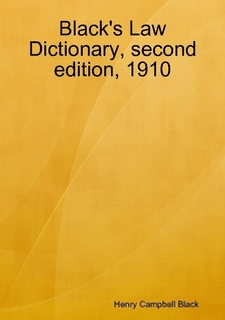One over whom or over whose property a guardian is appointed; a municipal district; in English cities, a municipal district under the supervision of an aider-man; the service of guarding a castle.
Definition of Ward
-
Ballentine's Law Dictionary
-
Black's Law Dictionary: 2nd Edition
1. Guarding; care; charge; as, the ward of a castle; so in the phrase "watch and ward."
2. A division in the city of London committed to the special ward (guardianship) of an alderman.
3. A territorial division is adopted in most American cities by which the municipality is separated into a number of precincts or districts called "wards" for purposes of police, sanitary regulations, prevention of fires, elections, etc.
4. A corridor, room, or other division Of a prison, hospital, or asylum.
5. An infant placed by authority of law under the care of a guardian. The person over whom or over whose property a guardian is appointed is called his "ward." Civ. Code Cal. § 237.
-Ward-corn. In old English law. The duty of keeping watch and ward, with a horn to blow upon any occasion of surprise. 1 Mon. Ang. 976.
—Ward-fegh. Sax. In old records.
-Ward-fee; the value of a ward, or the money paid to the lord for his redemption from wardship. Blount.
—Ward-holding. In old Scotch law. Tenure by military service; the proper feudal tenure of Scotland. Abolished by St. 20 Geo. II. c. 50. Ersk. Prin. 2, 4, 1,
—Ward in chancery.. An infant who is under the superintendence of the chancellor.
—Ward-mote. In English law. A court kept in every ward in London, commonly called the "ward-mote court," or "inquest." Cowell.
—Ward-penny. In old English law. Money paid to the sheriff or cas-tellaiiis, for the duty of watching and warding a castle. Spelman.
—Ward-staff. In old records. A constable's or watchman's staff. Co-well.
—Ward-wit. In old English law. Immunity or exemption from the duty or service of ward, or from contributing to such service. Spelman. Exemption from amercement for not finding a man to do ward. Fleta, lib. 1, c. 47, § 16.
—Wardage. Money paid and contributed to watch and ward. Domesday.
—Wards of admiralty. Seamen are sometimes thus designated, because, in view of their general improvidence and rashness, the admiralty courts are accustomed to scrutinize with great care their bargains and engagements, when brought before them, with a view to protecting them against imposition and overreaching.
—Wardship. In military tenures, the right of the lord to have custody, as guardian, of the body and lands of the infant heir, without any account of profits, until he was twenty-one or she sixteen. In socage the guardian was accountable for profits; and he was not the lord, but the nearest relative to whom the inheritance could not descend, and the wardship ceased at fourteen. In copyholds, the lord was the guardian. but was perhaps accountable for profits. Stim. Gloss. See 2 Bl. Comm. 67.
—Wardship in chivalry. An incident to the tenure of knight-service.
—Wardship in copyholds. The lord is guardian of nis infant tenant by special custom.

